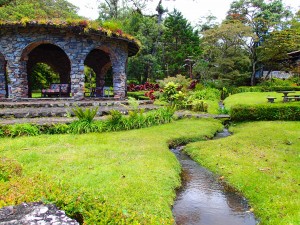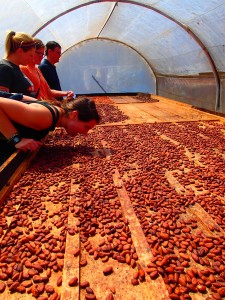As we leave Selva Negra for Granada, in transit to Costa Rica, I think I can speak for most of the group when I say that we feel satisfied and accomplished. Not only did we wipe out the restaurant’s entire supply of chocolate bars while simultaneously developing several intimate relationships with the various types of oh-so-decadent cakes, (taking our already existing collective sweet tooth to a whole new level), we more importantly had the opportunity to experience and observe Selva Negra’s sustainable eco-business, shade grown coffee, and overall community, while leading two projects to serve the community.

One of our classrooms at Selva Negra.
Upon our initial arrival to Selva Negra, we couldn’t help but notice some immediate differences between Selva Negra and the previous two communities we stayed in. The dogs and roosters we grew so used to waking up to in La Mariposa and Sabana Grande were replaced with howler monkeys and geese. The hot dry weather turned into rain, wind, and lots of sweater wearing. But beyond those locational differences, I think the biggest differences we picked up on were in the services provided at the hotel. At Selva Negra we had access to electricity, WIFI, warm showers, running water, flush toilets, fresh vegetables, gift shops, we were waited on by servers, we had maintenance workers cleaning our rooms daily. It felt strange re-adjusting back to a lifestyle we were familiar with in the States, full of these comfortable services, especially after getting used to and enjoying bucket showers, pit toilets, and learning to live in tune with the natural rhythms of the day without electricity.
It wasn’t until we took the tour of the Selva Negra community that we gained a better understanding of the system that existed beyond the hotel, and how the hotel played a role in that larger system as a whole. Selva Negra is a self-sustaining community that is supported by resources provided through their eco-business and tourism. The coffee production and hotel provide work and an income for the people in the community, as well as resources for health services and educational opportunities.
On the tour of the coffee “plantation” (it was more like a coffee forest even though it is technically maintained and controlled for production) we learned about the benefits of shade grown coffee and why it is a better and more sustainable alternative than agro-industrial grown coffee or even supposed “eco” or “fair trade” coffee. Shade grown coffee doesn’t damage the eco-system the coffee is grown in. Because the system of growing mimics a bio-diverse forest, nutrients are able to flow between plants, soil is replenished, and the wildlife are able to live there as if it was a continuous self-sufficient forest.
The business overall is very resourceful, disposing only one 55-gallon barrel of trash a month from all the 400 workers and guests that stay at the hotel. They reuse anything and everything they can, keeping what other businesses would deem trash in a warehouse full of scrap metals, plastics and rubber to be used for future projects. They have an incredible system of worm compost that transforms all their manure and lots of agricultural waste into resources for growing.

Up close and personal with drying cacao beans.
For the service portion of our trip, we were asked to help on two projects. One was to improve the hiking trails, because many guests were getting lost when they went out on the trails. So some of the group (Johnny, Nina, David, Chelsea and Julia) made new signs for the trails, and gave suggestions for how trailheads can be improved to provide a better understanding for their system of trails. The rest of the group (Evan, Travis and Jen) designed a cacao tour for their soon-to-be cacao production. They developed a detailed outline for the tour guides, based on research they found on the history of cacao, the production of cacao worldwide, the effects of production of cacao in Nicaragua, and specifically production at Selva Negra.
As we leave Selva Negra, we look forward to exploring and learning in a new country for the next five weeks. (And are ready to fully embrace whatever form of German Chocolate Cake Costa Rica has for us to discover.)
Nina
